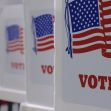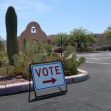Arizona Governor Doug Ducey wasted no time signing into law a controversial voting law passed just moments before in the State Legislature. The bill will remove certain individuals from the Permanent Early Voting List system within the state. Arizona follows Florida, Georgia, Montana, and Iowa in restricting voting access following the 2020 Presidential Election.
Under the new law, Senate Bill 1485, if a voter did not vote in primary and general elections for two consecutive election cycles, they would be removed from the Permanent Early Voter List, which has been renamed as the “Active” Early Voting List.
If an eligible voter has not voted in the past two years, the county recorder’s office will mail a notice that they will be removed from the list to receive ballots in the mail. If an individual does not respond within 90 days to that notice, they will be removed from the list as well as more traditional voting at a polling site until they respond to the county office.
Ducey called it a victory for “election integrity” by passing a law that “ensures Arizona remains a leader for inclusive, accessible, efficient, and secure election administration.” Senate Bill 1485 will be implemented after the 2024 elections.
Democrats in Arizona criticized the bill as trying to fix a system that wasn’t broken. They claim the legislation could remove more than 100,000 names from the list and would disproportionately “suppress the votes of low-income, Black, Latino, and Native American voters.” Other critics note that independent voters, those who do not wish to be registered as either Republican or Democrat, are especially vulnerable from being stricken from the list as they don’t automatically receive ballots for partisan primary elections.
State Senator Michelle Ugenti-Rita (R) sponsored the bill which passed along party lines in a narrow 16-14 margin victory. Ugenti-Rita dismissed political opposition to the bill, rebuking Democrats by stating, “not everything has to do with Biden and Trump,” and that this law just “makes sense.” Other Republicans applauded the legislation as a way to confirm the list for early voters is accurate.
Arizona saw a record voter turnout for the 2020 Presidential Election which flipped the state to blue, voting for then-President candidate Joseph R. Biden, the first Democrat since 1996. Republicans in Arizona pushed for an audit of votes in Maricopa County, the largest county and home to the capital, Phoenix. The Maricopa County audit is in its final stages.
On May 6, 2021, Florida Governor Ron DeSantis signed a similar bill, Senate Bill 90, to restrict voting access for those who wish to vote by mail. The legislation limits the use of drop boxes to turn in absentee ballots and requires stricter identification requirements for absentee voting. Opponents of the law in Florida, like those in Arizona, criticize their new law stating it will excessively affect minority communities and voters of color.
Outside of politics, some opponents of the bill are anxious over the economic impact this new legislation will have on the state. Shortly after Georgia passed its own restrictive voting law in late March 2021, Major League Baseball’s summer All-Star Game was pulled from Atlanta to protest what they saw as a restrictive law that would disproportionately impact Black Americans. Arizona is scheduled to hold the Super Bowl in 2023 and the NCAA Men’s Final Four in 2024.
The Navajo Nation’s President, Jonathan Nez, remarked that the new law is an “assault” on the voting rights of the tribal nation and stated that “it’s pushing back on the voters of tribal communities, and came out in big numbers to vote [their] candidate of choice, which is President Biden.”
The Navajo Nation is the largest Native American reservation in the United States, encompassing 27,000 square miles in Arizona, New Mexico, and Utah. As of 2010, Arizona is home to at least 101,835 of the Navajo population. The Navajo Nation has no urban centers, making the Permanent Early Voter List a viable option for those living throughout the reservation within Arizona’s borders.






